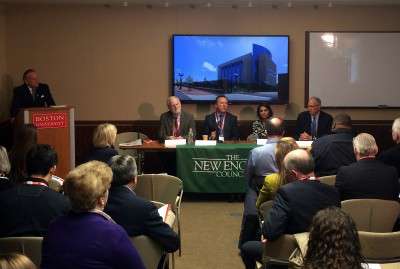
A conference was held at Boston University’s National Emerging Infectious Diseases Laboratories Friday to address myths and facts surrounding the Ebola virus, which has infected four Americans to date.
The conference, hosted by The New England Council, invited Nahid Bhadelia, NEIDL’s director of infection control; Paul Biddinger, director of operations for emergency medicine and medical director for emergency preparedness at Massachusetts General Hospital; Jamie Childs, senior research scientist and lecturer in epidemiology at Yale School of Public Health; and Ronald Corley, director of NEIDL, to speak on proper treatment and prevention methods of the Ebola virus.
“Here in Massachusetts, we began planning for the possibility of a patient with Ebola arriving at our healthcare doors before the World Health Organization even declared this an international concern,” said Cheryl Bartlett, commissioner of Massachusetts Department of Public Health, who spoke before the four panelists. “With teams of experts and professionals… we have planning and supporting protocols that are based on fact and not on hype.”
So far, four people have contracted Ebola in the United States – two healed fully, one is still in isolation and one succumbed to the virus. Eric Duncan, who died from Ebola, was a Liberian man diagnosed with the virus in the United States in late September. He died only days later in Dallas.
“We have evidence from our own experience with Thomas Duncan and his close contacts,” Bhadelia said. “His family members and all the community contacts, none of them have developed the symptoms, and that really supports the evidence that we already have in terms of the transmissibility, not just that there is none in asymptomatic patients, but that it’s very low early in disease.”
Americans have virtually no chance of contracting Ebola, Bhadelia said, and people are generally at very low risk of actually becoming infected with Ebola. The virus does, however, become more infectious as it goes without treatment and the amount of bacteria in the blood grows.
“Early in the disease, I think the chances [of spreading the virus] are very, very low, but I think that increases as you get sicker patients,” Bhadelia said.
Biddinger said it is imperative that experts provide people the information they need to identify and prevent Ebola. People must be honest in addressing the risks facing those who decide to travel to Ebola-infected areas, he said, and they must be informed of ways to protect themselves before, during and after the trip.
The researchers at NEIDL are doing what they can to be as transparent with the public about the potential risks surrounding Ebola, Corley said.
“We’re doing everything that we can to begin to develop the types of programs that will help educate, starting with middle school children, but also talking to adults around the community,” he said. “This is incredibly important. It’s not just about Ebola. It’s about infectious diseases in general, and it’s about research, and we have to be able to develop that fact to face contact to show that we’re not just nerds working in a facility.”
New England hospitals have been developing handling and treatment of cases of Ebola by referring to protocol taken during the Severe Acute Respiratory Syndrome and Anthrax epidemics, Biddinger said.
“It’s worth noting, both for community hospitals and for the academic medical centers, how much really is going into, and has to go into, preparedness for this,” Biddinger said. “It’s different, and we’ve been doing preparedness for a really long time in a lot of our hospitals. This isn’t something you start and are trying to develop, but with that being said, this requires an awful lot of new work. We’ve all…put together a lot of effort to train and retrain.”
All in all, Biddinger said we must maintain national response to the epidemic to prevent the situation from escalating further.
“We have to sustain our own national health response and preparedness efforts,” he said. “It really is hard to imagine that in five years, we are going to be better prepared than we are today if we continue this dwindling investing. I think we’re all in agreement, the threats are actually increasing rather than decreasing, across the globe certainly, but also across the country.”


















































































































ebola in us • Mar 30, 2015 at 4:26 am
I love what you guys are up too. This sort of clever work and coverage!
Keep up the amazing works guys I’ve added you guys to my own blogroll.
studymeet.com • Dec 5, 2014 at 4:48 pm
Fantastic goods from you, man. I have take into account your stuff previous to and you are just too magnificent.
I really like what you’ve received right here, really like what you are
stating and the way during which you say it. You’re making it enjoyable and you continue to care for to stay
it sensible. I can not wait to read much more from you. This is really a wonderful website.